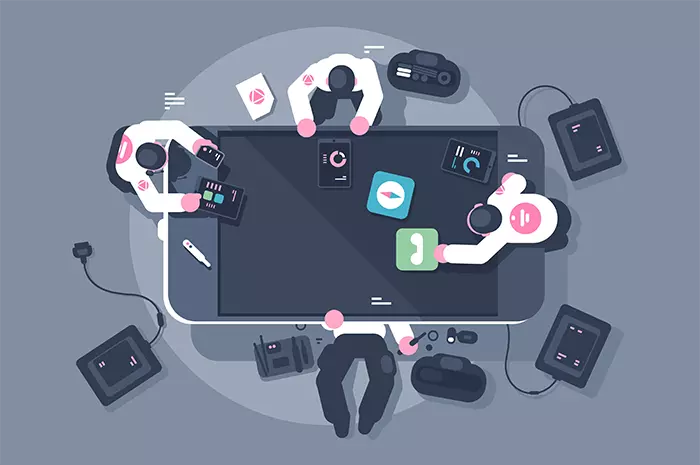Today, BluEnt finally addresses the age-old question: iOS or Android? With the app economy projecting to double to $101 billion by 2020, startups and enterprises are scrambling to find out where they fit in this global phenomenon. After all, a healthcare mobile application and a social media app will have completely different user bases, Android App development needs, and costs that need to be taken into account when choosing which platform to use.
In this article, we’ve created a comprehensive iOS vs Android comparison to help you make the decision with confidence. Ready to get started?
iOS vs Android Users
When it comes to iOS vs Android market share, Android is by far the winner. By the third quarter of 2016, it had captured 88% of the global smartphones market. By contrast, Apple’s iOS share fell slightly to 12% in the same period. However, what iOS lacks in market share, it makes up for in the demographics and behavior of its core users.
Apple typically attracts customers who show higher levels of engagement and more spending per app. Typically, iOS users have higher income and higher education levels. This is because its users are concentrated in developed nations, whereas Android app development is growing significantly in developing nations. Of course, keep in mind that these trends are general observations about millions of users – there are plenty of individual apps and geographic areas that defy them.
iOS vs Android Customization
Since Android uses an open source operating system, it provides mobile app developers with deeper access. Unlike iOS, there are several “mods” such as Paranoid Android and CyanogenMod that enable clients to create home screen replacements, sophisticated audio/video features and take advantage of custom ROM options. If you’re looking to test the limits of a personalized, integrated user experience, Android is the way to go.
Have a big idea for innovating the Android mobile app experience? Chat with one of our Android app developers to get your questions answered.
iOS vs Android for Business Use
In recent years, iOS has outpaced Blackberry in the market for enterprise mobility apps. Interestingly enough, the operating system’s lack of “openness” when it comes to iOS vs. Android development has given it a reputation for greater security. Thus, MDM providers have amassed an impressive array of tools and techniques for managing apps on iOS devices. Apple itself has aggressively encouraged developers to take choose Apple for enterprise app development. It now has programs such as the iOS Developer Enterprise Program and recently partnered with IBM to continue creating innovative business solutions on mobile.
BluEnt has years of experience developing iPhone/iPad applications for enterprise mobility solutions. From human resources management to business analytics, our app developers have mastered the art of optimizing the iOS user experience for business use. Check out our portfolio to get a glimpse of what we can do.
iOS vs Android Development Difficulty & Cost
An important factor when it comes to iOS vs Android app development is the number of resources you have to invest in the development process. The biggest difference between iOS and Android software for a developer is the level of fragmentation, which is much higher for the Android. That is, developing an app for one Android device requires making an app that can be accessed on a myriad of Android devices, all with different DPIs and aspect ratios.
Moreover, there’s additional fragmentation that stems from the multiple different versions of Android operating systems currently in use. Where over 80% of Apple users are on iOS 8 which was released in September 2014, not even 10% of all Android users are on Lollipop, which was released in June of the same year.
Even though fragmentation makes it more complex to create an Android app, the open nature of Android opens up a wide array of possibilities in terms of the variety of devices that one app can be accessed on. From TV’s to wearables to in-car entertainment, Android app development is extremely scalable and could result in a much higher ROI in the long run despite initial costs being higher. This is a highly attractive opportunity for startups, since the world is your oyster in terms of reaching new markets that have yet to be explored.
However, if your resources are limited, iOS mobile application development is currently the more cost-effective option. The smaller range of devices to run on and shorter, more straightforward development process is the best bang for your buck when it comes to executing a simple idea done well.
Want to find out exactly how much your next app will cost on Android or iOS? Fill out a form to receive a quote.
iOS vs Android Expected Revenue
As the market currently stands, iOS is your best bet for capturing the most revenue. The revenue models for Android and iOS apps are vastly different. The former tends to lean towards ad-supported apps to generate in-app revenue, whereas most iOS apps make money by charging an upfront fee for downloading the app itself.
Numerous studies show that iPhone apps and iPad apps earn significantly more money. Considering that Apple users tend to have a higher income and report higher engagement, this isn’t a surprise. However, don’t forget that the Android market is also significantly larger, and thus enables you to reach an increasingly enormous audience. Attracting a massive group of new users could be a more effective business strategy than engaging the same customers over and over.
In BluEnt’s opinion, there’s no clear winner when it comes to which platform is the ultimate winner of the debate. However, we hope this article shed some light on whether iOS or Android is best for your next app. If not, there is also always the option to go cross-platform and appeal to both the iOS and Android market, but that’s a story for another day. You want us to develop a mobile app for you, so what are you waiting for? Reach us to keep the discussion going.



 How Much Does App Development Cost? A Budget Estimation Guide
How Much Does App Development Cost? A Budget Estimation Guide  Using Angular to Develop Mobile Apps Can Be a Game Changer for Your Business
Using Angular to Develop Mobile Apps Can Be a Game Changer for Your Business  Pros and Cons of the WooCommerce Plugin for Online Merchants
Pros and Cons of the WooCommerce Plugin for Online Merchants  Mean Stack vs LAMP Stack: Which One is Better for Your Business?
Mean Stack vs LAMP Stack: Which One is Better for Your Business? 
